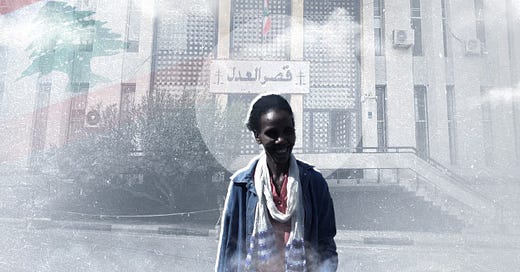Originally published at Alhurra by Randa Jebai
Mezrit Hailu returned to Beirut after six years—not as a victim behind closed doors, but as a woman with a cause, standing face-to-face with a judge in the first case of its kind in Lebanon: a domestic worker suing her former employer on charges of "slavery."
“Everything is okay,” Hailu says in a video published last week by Legal Action Worldwide. The video coincided with her first court appearance in Lebanon after years of abuse, detention, and unpaid labor.
Her story began in 2011, when she arrived at Beirut’s Rafic Hariri International Airport, carrying a small bag and a big dream. She had left behind a difficult life in Ethiopia, seeking a chance to lift her family out of poverty. But, as she recounts, that dream turned into a nightmare from the very beginning.
According to the legal complaint, her passport was confiscated at the airport, and from that moment, Lebanon became a "prison" for her. She was denied rest, contact with the outside world, forbidden from leaving the house, and subjected to physical and verbal abuse.
For over eight years, Hailu lived in conditions akin to slavery. She received no wages for seven of those years—until she managed to escape and return to Ethiopia in September 2019.
Attorney Ghada Nicola of Legal Action Worldwide says the organization learned of Hailu’s ordeal by chance through social media. After further investigation, they contacted her and built a detailed legal case.
Nicola told Alhurra that what Hailu endured qualifies, under international humanitarian law, as a form of slavery and servitude.
What Is Modern Slavery?
The United Nations defines “modern slavery” as an umbrella term encompassing forced labor, forced marriage, debt bondage, and human trafficking—forms of exploitation that victims cannot refuse or escape due to threats, deception, or abuse of power.
According to UN reports, modern slavery occurs in nearly every country—including high-income nations. Statistics show that 52% of forced labor cases and a quarter of forced marriages happen in such countries.
Nicola explains that while Lebanon does not explicitly criminalize modern slavery, it is legally bound under its constitution, particularly its preamble, to uphold international human rights treaties.
The 1926 Slavery Convention and the Rome Statute of the International Criminal Court both prohibit slavery and classify it as a crime against humanity. Lebanon is a signatory to these treaties and therefore obligated to enforce them and prosecute violations.
A Legal Milestone
The case, filed under the pseudonym “M.H.,” held its first hearing on May 27, 2025, after years of delays caused by the COVID-19 pandemic, repeated strikes by judges and lawyers, and the general sluggishness of the Lebanese judicial system.
But Nicola sees the lawsuit as a “landmark moment” for the rights of migrant domestic workers in Lebanon—one that could pave the way for more cases in the future.
This case is unprecedented in Lebanon. Despite an estimated 250,000 domestic workers employed under the kafala (sponsorship) system, no previous lawsuit has accused an employer of enslavement or human trafficking.
Nicola describes the kafala system as “a system of slavery in every sense of the word.” She points out that under Article 7 of Lebanon’s Labor Law, domestic workers are excluded from legal protections afforded to other workers.
Their legal status in Lebanon is governed by a standard employment contract and the Foreigners Law, which ties their legal residency to a Lebanese sponsor—often their employer.
This system prevents workers from changing jobs or leaving the country without written permission from their sponsor, leaving them legally and socially vulnerable.
Nicola notes that the kafala system facilitates the flow of low-wage labor into the Middle East and Gulf countries, where migrant workers face conditions akin to forced labor—including constant threats of deportation, psychological abuse, verbal harassment, and even sexual violence.
Structural Exploitation
A 2020 Harvard University study titled “Modern Slavery: The Kafala System in Lebanon” found that the employment of foreign domestic workers began in earnest after Lebanon’s civil war in the 1970s, as waves of migrants from Africa and Asia arrived. Since then, a systematic framework of exploitation has emerged, targeting women from poor countries to perform low-paid work with no legal protection.
In Hailu’s case, she was denied not just her freedom, but also her financial rights. She received no pay during her entire time of service.
Hailu says the ordeal was more than a legal violation—it shattered a personal dream: to help her brother finish school and lift her family out of poverty.
According to the International Labour Organization, 1 in every 150 people worldwide lives in some form of modern slavery, with 27.6 million people in forced labor.
Migrant workers are the most vulnerable group, especially those employed in construction, agriculture, textiles, and domestic work—trapped by unfair contracts that prevent them from returning home or changing jobs.
A Crack in the Wall of Silence
Nicola says the case is now in the hands of the court, and investigations are ongoing. But the true importance of the case, she emphasizes, lies not just in its legal trajectory—but in the fact that “it broke the silence and opened a door of hope for many domestic workers living in the shadows.”
At the end of the video, Hailu delivers a message: this lawsuit is not just about reclaiming her rights—but about every girl living today through the same story, or who has lived through the same conditions.
A System Under Scrutiny
With the kafala system still in place, Lebanon faces growing international criticism—especially from the United States, which has placed the country in Tier 2 of its Trafficking in Persons report since the early 2000s. That classification remains unchanged to this day.
So—could Mezrit Hailu’s case mark a true turning point in restoring the rights of domestic workers? Could it open the door for a sweeping review of a system long described as "legalized slavery"?





